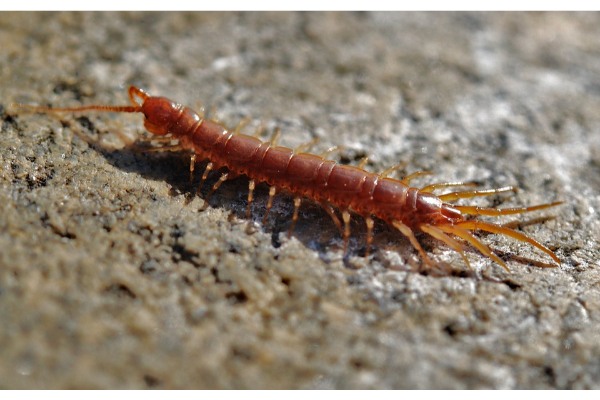Animal-eating insects include centipedes. Forcipules, the name for their pointed pincers, are present. Each and every centipede has a poisonous bite that causes the release of this poison. They can bite humans, though they typically only use their pincers to attack and kill their prey. Most of the time, they will try to flee and hide, but they have been known to attack if cornered. Their bites frequently leave a sizable red welt on the skin and can be extremely painful. This might persist for a few days or even a week. Additionally, they might result in fever, chills, and weakness. Even anaphylactic shock may occur in some people.
Is your home a haven for centipedes? If you have centipedes in your home, you must use efficient pest control to eradicate them and stop them from returning. This creepy crawlies can get inside your house and even end up in your bed. The following advice will help you keep centipedes out of your bed.
Why Are There House Centipedes In Your House?
Typically, house centipedes prefer warm, tropical climates. You should be aware, however, that they have shown to be remarkably adaptable and can endure in almost any climate.
Now, if you reside in a region with a more severe climate, you should be aware that due to the pleasant and warm climate, centipedes will probably find their way inside your home. More importantly, they will have access to food inside.
Given that a centipede’s eyes are quite sensitive to light, you should be aware that they will search for various places to hide during the day. If you don’t thoroughly clean your home during the day, centipedes could very well hide there very conveniently.
You should also be aware that a typical centipede can live an unbothered life at the base of a building while only feeding on insects.
You should be aware of the fact that these insects pose no threat to humans at all. Although it is probably going to bite someone, you should be aware that the likelihood of that happening is incredibly slim.
To make that happen, you would need to actually pick up the centipede and give it to someone else.
When centipedes know their venom won’t have any effect on humans, they don’t waste it on them. They would rather save it for an insect they can actually capture and kill.
If a house centipede bites you, you’ll likely develop a small bump where it happened. There may be a little itching in some circumstances, but that’s about it.
The concerning part is that many people awaken in the morning to find these house centipedes crawling across their beds. The last thing you want to wake up to is a centipede crawling on your face or, even worse, in your bed.
A number of actions can be taken to get rid of centipedes if you see them moving on or near your bed.
What Attracts Centipedes To Your Home?
Centipedes, as you may know, are multi-legged animals that are extremely adaptable. They exist in a variety of climates. They can be found in hot, moist environments like tropical rainforests, cold environments like the Arctic Circle, and hot, dry areas like deserts all over the world. It follows that, despite your best efforts, you cannot outrun them.
They are venomous, so you should keep them far away from you. Although centipedes are unlikely to cause your death, their bite can still result in a fever, chills, swellings, and generalized weakness in the body. The venom of the centipede may result in anaphylactic shock and eventual death in some individuals.
You must keep centipedes away from your bed because you cannot outrun them. Recognizing what draws them to your home is therefore helpful. Some of the conditions that attract centipedes include:
- The presence of dark spots in which they can hide
- A lot of warmth and dampness
- The presence of food in the form of other insects

9 Tips To Keep Centipedes Out of Your Bed
Set Up Barriers To Keep Them from Entering Your Home.
A great way to stop centipedes from getting inside your house in the first place is to seal the exterior. These pests are kept out of your home and bed by insect repellents or pesticides. Any insect that enters your home’s perimeter after being sprayed with the chemical Lambda-cyhalothrin will be killed. A more natural pest deterrent option is cayenne pepper or peppermint oil.
Keep Your House Dry.
The perfect setting for attracting centipedes is moist terrain. Keeping moisture out of your home will help keep them away because they thrive in dark, damp areas. In order to keep them out of your bedroom, use a dehumidifier. Fans are another option you have to help the air move and keep moisture out of the space.
Sealing Off Cracks.
Inspecting your home for pests and insect entry points and sealing them off is another way to keep them out of your home. The majority of insects that enter your home typically do so through microscopic gaps in the windows.
You must make sure to thoroughly examine any cracks in your home before properly caulking them shut. It won’t just prevent additional centipedes from getting inside; it’ll also keep out spiders and all the other scurrying critters.
It’s a good idea to walk around the property and carefully look for even the smallest cracks. These holes and cracks typically occur close to window frames and other openings. You must close them off.
Pests won’t be able to enter your home thanks to any type of sealant, so use that.
It can be difficult to get rid of pests if they are already infesting your home. In many cases, centipedes that are inside your home will be challenging to find and eliminate.
Use Pesticide.
The best way to get rid of insects in your house is with a natural pesticide. It’s crucial to eliminate all pests from your home because centipedes eat other insects. Diatomaceous earth or boric acid can be sprayed on any insects you come across to instantly kill them. These alternatives are safer for use indoors and less toxic than other pesticides.
Set Insect Traps.
Setting traps will assist in getting rid of insects or centipedes that you suspect have invaded your house or bedroom. Any insect that steps on sticky traps will be captured by a glue solution. Set up these traps in locations where centipedes have been spotted or where you anticipate seeing them. Your basement, bathroom, and bedroom are some examples of these areas.
Reduce the Clutter In Your Home.
Centipedes can hide and thrive in many different places in a cluttered home. Clean up your house, especially in damp areas like the basement, and clear all clutter from the floors. In order to give insects fewer places to live, you should also remove clutter from the area around your home.
Remove Your Bed And Clean It.
The best way to get rid of centipedes in your bed is to give it a thorough cleaning. Deep-clean your mattresses and bedding after removing your bed from the house. Additionally clean the bed’s headboard, frame, and footboard. While you’re at it, tidy up your bedroom, get rid of any clutter, and make sure to get rid of any insects you spot.
Deal With The Issue Immediately.
Dealing with a problem as soon as it arises is one of the best ways to stop centipedes from slithering into your bed. Insects and centipedes should be killed or removed from your home at the first sign of either. Insects reproduce quickly, and if they are not controlled, they will quickly grow into a much bigger problem.
Call A Pest Control Service.
If you have used all of these suggestions and are still having problems with centipedes, it might be time to consult a professional. An expert in pest control can evaluate your situation and assist in permanently solving the issue.
Final Thought
We are all aware of how frustrating centipedes can be, especially if you live somewhere with a lot of them. For this specific issue you are having, there are numerous solutions. You’ll be able to keep them away from your bed, we’re sure of it.
